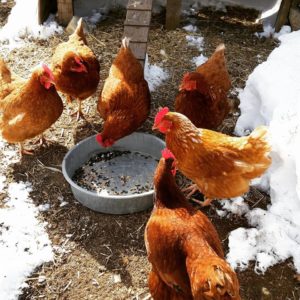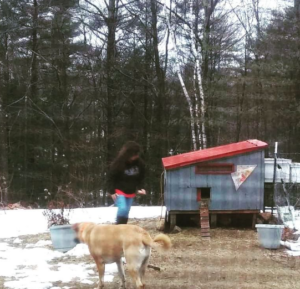Henopause Haven
by May Woodworth
 The decision of what to do with older chickens is different for everyone. For many it is a difficult decision. The decision can be even harder if the birds in question have been pets, in addition to egg providers- or in the case of roosters-protectors of the flock.
The decision of what to do with older chickens is different for everyone. For many it is a difficult decision. The decision can be even harder if the birds in question have been pets, in addition to egg providers- or in the case of roosters-protectors of the flock.
The spectrum of options for senior (or ill/physically disabled) chickens’ ranges from culling as soon as they stop providing a service, to ICU chicken care. Many (including me) choose what lie in between. 
When our six Golden Comets stopped laying- and our rooster became severely impaired-I watched them age, and then euthanized each individual bird as their quality of life deteriorated. Despite my vision of them dying peacefully in their coop, only one of our girls died that way.
Chickens stop laying at different ages, depending on the breed, and whether they lay throughout the winter (supplemental lighting is often implemented to accomplish this). A sex-link, or hybrid chicken is a prolific egg layer. They lay their lifetime allotment of eggs sooner than say, a purebred chicken who lays less eggs per year.
Many people do not know this. I didn’t, until our we acquired Red, our adopted Rhode Island Red. She was still laying at six years old (a few a week), while our Golden Comets abruptly stopped at around two years old. I was new to chickens and unprepared to be almost eggless. New chicks were bought, but it would be months before they laid. For emotional reasons, I was not ready to part with my girls.
It was at then, that I set up Henopause Haven. It was to be the final stop for our aging hens. I would enjoy our Comets for as long as possible. They would also keep Red company, as her egg laying petered off.
Within three years of welcoming the Comets and the Rhode Island Red into our life, they were senior. Up until that point, I was experienced in chick, and middle -aged chicken care. Now I could add senior chicken care to my list of skills.
Like animal care in general, everyone’s experience with senior chickens is different. There were downfalls to caring for animals that no longer provide the originally intended service, and require more care, but I saw benefits in keeping them around. I made a pros and cons list. I would love to hear other people’s pros and cons as well.

Pros
-Pest control: Chickens of any age can provide pest control while grazing. Fleas, ticks, garden pests, rodents, lawn grubs, etc.… are some of their favorites. An older chicken may not graze as long, or as often, but they can still provide this service.
-Companionship: If you have had the pleasure of the chicken connection, you know that their value can extend beyond egg production.
-Noise reduction: The (very loud) morning egg laying song (multiplied by the number of egg layers) can be pleasurable for some people. For others, that song is a cacophony. A reprieve from it goes hand in hand with zero egg production. The ‘normal’ hen squabbling still occurs, however.
-Freedom: Senior hens who were once confined to coops and runs in the morning (to ensure eggs are not hidden all over the place), can now be let out whenever you want to let them out.
-Diet change: Since senior chickens no longer need layer food nutrients, you can feed them whatever you desire. Please keep in mind that they still do best on a balanced diet, but it doesn’t have to be as strict as when they were laying.
Cons
-Health issues: Some chickens breeze through life without an issue, and die peacefully in their coop, many more suffer from age related health issues. Internal cysts, arthritis, reproductive tumors, etc.… are a few common ones. Herbs, periods of chicken isolation during a health issue, or medications could be involved. While some people can handle caring for senior birds-or birds with ailments-others cannot. It also takes time from other tasks to care for ailing critters. Do what is best for you and your entire homestead.
-Grooming: I always admired my Comets’ glossy coats, and clean fluffy butts. I rarely had to intervene. That changed with age. With reduced mobility, they took less dirt baths. Preening was less vigorous. Not every hen will cooperate when you clean them, or trim nails, and not every person is comfortable doing so.
-Space: The housing your hens have been living in may be needed for the future egg laying flock. If you do not want to rehouse them, another coop will be needed.
-Comfort: Since our hens were less active, we became more diligent in shoveling paths for them when it snowed, to enable them to venture out if desired.. I checked on them more frequently to monitor their food, and water. Nesting boxes were cleaned more often, as they now used them to sleep in, instead if roosting.

I have heard of people letting senior hens (who formally had safe enclosures) just roam their property, and take shelter where they choose. Please keep in mind, that senior chickens have less defense against predators. While it may seem easier to ‘let nature take its course’, it will be a scary end for them.
-Feeding: You must be comfortable feeding a chicken that no longer lays.
If you do decide to enjoy your feathered friends into their golden years, please educate yourself as to what that may entail. If you decide not to-an ethical, humane end is always the best route. For any animal entrusted to your care.














4 Comments
My oldest girl, Easter Egger, is 12 years old. She’ll have 6 new roomies in a few months.
I’d add another reason not to leave them roaming unhoused until a predator finds them: you don’t want predators to think of your yard as a feeding station if you keep other (tasty to them) animals. No sense attracting the unwanted attention from them.
I will keep all my senior hens until its their time.They are my pets. And I enjoy caring for them. I have 9 hens. Their ages range from 5 yrs. to 2 yrs. in age.
That’s awesome. I hope your girls bring you great joy for years to come!